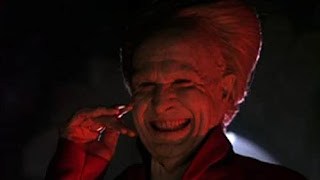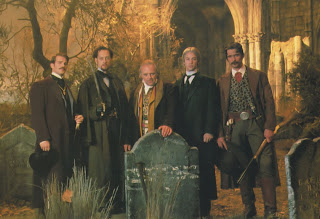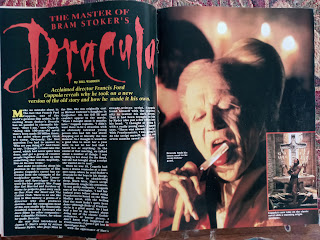The occasion of Bram Stoker's Dracula's 30th anniversary this past Sunday on November 13th prompted me to dig out my copy of Fangoria #118. Some of my greatest nostalgia for Bram Stoker's Dracula isn't for the film itself (which I love) but for the hype that surrounded its release. Beginning with the teaser posters that bore only the single word "Beware," the ad campaign for Bram Stoker's Dracula was memorable in and of itself. With so much riding on its success, the advance press for Bram Stoker's Dracula gamely fed into the hoopla and it's no surprise that the #1 horror magazine in the world would go all in on it.
Back in the fall of '92, the cover for Fango #118 was an instant favorite for me with its dramatic close-up of Dracula in his bat form (one of the many looks for Dracula created by Greg Cannom, who won the Best Makeup Oscar for his work here). Whenever I look at it, I get an instant rush of nostalgia. In our current time when stills for new movies appear on our Facebook and Twitter feeds as part of the constant churn of content we continually scroll through during our day, it's hard to convey what an essential role magazines like Fangoria used to play in the lives of film fans.
Today we get new info on upcoming films on practically a minute by minute basis but back then, when print was the primary conduit of information, you had to wait for a new issue to hit the stands before you could get the scoop on whatever movie you were excited for. You went weeks with nothing, or whatever the length of time it happened to be between new issues being shipped, and when that new issue finally arrived, it felt like an event.
In horror terms, no one expected Coppola's adaptation to be another Exorcist or Alien but at a time when studio interest in the genre had been faltering for years, any kind of high profile investment in horror mattered and the success or failure of Bram Stoker's Dracula would have an impact on the genre's fortunes going forward.
Coming off the late '80s, horror had become largely an object of contempt in the eyes of the studios. Even when horror had a prestigious hit in the early '90s, like Misery or The Silence of the Lambs, the impulse of the time was to not even call those movies "horror." Since then, as horror has become more respected, those films have been accepted as genre pictures but in the early '90s, movies like those were "psychological thrillers" while the horror tag was only fit for slasher sequels like Jason Takes Manhattan. So to have Coppola unabashedly referring to his take on Dracula as horror in interviews for the film was an opportunity for the genre to gain some esteem back at a time when it was at a low ebb.
Its success may not have led to an immediate horror renaissance but it did establish that interest in the genre was very much alive and subsequent big budget classic monster revamps in the form of Mary Shelley's Frankenstein, Mary Reilly, and Wolf (criminally underrated!), soon followed.
A few years later, in '96, the release of Scream was what really ended the lean years for horror and the genre has never had another fallow period like '89 to '95 since. The success of Scream buoyed the genre until The Blair Witch Project in '99, then another wave kicked off in 2004 with Saw, the next trend hit with Paranormal Activity in '09, and so on. Point being that for the larger part of the last thirty years the popularity of the genre has never really let up. With the recent announcement that former DC Films president Walter Hamada is moving to Paramount to head their horror line and the even bigger news that Jason Blum and James Wan are planning to combine their respective studios, Blumhouse Pictures and Atomic Monster, into one gi-normous horror factory means that the genre is going to remain huge for, well, let's just say for a very, very long time. We're not going to have to wait for some major filmmaker to come along and help rescue it from obsolescence, that's for sure.
So that's another layer of nostalgia attached to Bram Stoker's Dracula in that it is a reminder of a time when the horror genre felt like it was dangerously on the precipice of fading away. With horror having been thriving for longer than today's young fans can even remember, it's hard to imagine the genre's future being pinned on the success or failure of just one movie but in 1992, horror fans were depending on Coppola to deliver a much-needed hit for the genre. In Tony Timpone's editorial in Fangoria #119, he quoted a Fango Hall of Famer who wished to remain anonymous as saying "If Dracula flops, we can all pack our bags." Reading all the details about Bram Stoker's Dracula in Fango prior to its release, fans then could only hope that the "horror event of the decade" would help ensure the genre's continued survival in the '90s and not put a stake in its heart.












No comments:
Post a Comment